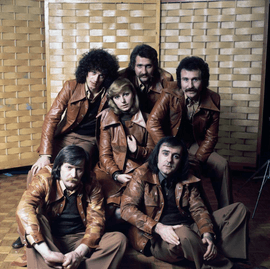Ambasadori
| Ambasadori | |
|---|---|
 Ambasadori in The Hague on 3 April 1976, the day of their Eurovision appearance. | |
| Background information | |
| Origin | Sarajevo, SR Bosnia-Herzegovina, SFR Yugoslavia |
| Genres | Schlager pop |
| Years active | 1968–1980 |
| Labels | Beograd disk |
| Associated acts | Zdravko Čolić, Hari Varešanović, Kodeksi, Jutro, Korni Grupa, Pro Arte |
| Past members |
Slobodan Vujović Robert Ivanović Srđan Stefanović Zdravko Čolić Hari Varešanović Ivica Sindic Krešimir Vlašić Ismeta Dervoz-Krvavac Perica Stojanović Vlado Pravdić Ivica Vinković Zlatko Hold Andrej Stefanović Jasna Gospić Miroslav Balta Sead Džumhur Miroslav Maraus Sinan Alimanović Neven Pocrnjić Ranko Rihtman Damir Jurišić Darko Arkus Slavko Jerković Enes Bajramović Hrvoje Tikvicki Nenad Čikojević Edo Bogeljić Nazif Dinarević Tihomir Doleček Miroslav Šaranović Sead Avdić Dragan Nikačević Velibor Čolović |
Ambasadori were a Yugoslav pop band from Sarajevo, SR Bosnia-Herzegovina, SFR Yugoslavia active from 1968 until 1980. The band is most notable for its 1975 hit single "Zemljo moja" as well as for representing Yugoslavia at the 1976 Eurovision Song Contest, in addition to having two future pop stars Zdravko Čolić (between 1969 and 1971) and Hari Varešanović as its one time singers.[1]
History
Ambasadori were founded in Sarajevo in 1968[2] by two military brass band musicians and Yugoslav People's Army (JNA) recruits — keyboardist Robert Ivanović who had come from Belgrade shortly prior to establishing the band and trombonist Srđan Stefanović. They soon brought guitarist Slobodan Vujović, a civilian, into the band. Still mostly a cover band at this stage, the group's repertoire centered around the 1960s rhythm & blues covers (Chicago, Otis Redding, Wilson Pickett, etc.) along with more covers of obligatory Yugoslav hits of the day and years past, and finally even a few original numbers written by the band members thrown into the mix. Their very first performance took place in May 1969 in Sarajevo's Dom JNA (Yugoslav People's Army House). Soon after, eighteen-year-old Zdravko Čolić, a fresh high school graduate, joined the band as its new vocalist. With young Čolić as the vocalist, Vujović on guitar, Ivanović on keyboards, Ivica Sindičić on saxophone, Srđan Stefanović on trombone, Slobodan Jerković on bass guitar, Vlatko Anković on trumpet, and Tihomir Določek on drums, most of the band's activity involved gigging around Sarajevo in clubs like Trasa, FIS, and Sloga as well as the odd appearance in recently built Dom Mladih (Youth House), part of the new Skenderija complex. Over time, the group started getting more gig offers, which presented a problem since its band members that were also JNA recruits weren't available for many of them and as a result, those offers had to be declined.
By 1970, seeing their business opportunities limited by the strange setup within the band, Vujović and Čolić decided to step out and form a new group, Novi Ambasadori (New Ambassadors), bringing in drummer Perica Stojanović, organist Vlado Pravdić, saxophonist Andrej "Lale" Stefanović, and bassist Zlatko Hold. With an almost all new lineup, the band also expanded its repertoire so that in addition to R&B they now also began playing covers of Led Zeppelin, Blood, Sweat & Tears, Creedence Clearwater Revival, etc. With Vujović now firmly established as the band's driving force and main songwriter, in the summer of 1970, Novi Ambasadori scored a month-long gig with Indexi in Dubrovnik, their first tour-like experience and a taste of life on the road.
Next step was competing at the 1971 Vaš šlager sezone annual competitive festival in Sarajevo where they finished in 7th place with "Plačem za tvojim usnama", a song that songwriter Zdenko Runjić claimed to have composed and officially signed his name under despite it being a blatant rip-off of The Tremeloes' "Suddenly You Love Me" (itself a cover of Riccardo Del Turco's "Uno tranquillo"). No one from the festival noticed the plagiarism and the band avoided controversy. The song became the band's debut release — 7-inch (two-side) single "Plačem za tvojim usnama" / "Zapjevaj" released in 1971 by Beograd Disk label. By now, Vujović's Novi Ambasadori dropped the 'Novi' part, continuing on as Ambasadori since the original band's founders Ivanović and Stefanović were no longer involved with music and gave up on protecting the name.
In 1975, Ambasadori scored a sizable hit with their entry at that year's Vaš šlager sezone festival — Kemal Monteno-written patriotic schlager song "Zemljo moja", inspired by and dedicated to Yugoslav gastarbeiters leaving their homeland in search of expanded employment opportunities throughout Western Europe.
Ambasadori represented SFR Yugoslavia at the 1976 Eurovision Song Contest, finishing second last among the 18 participating countries.
Other Ambasadori members that came and went throughout the 1968 -1970s include various musicians active on the Sarajevo music scene at the time and after, such as trombone player Srđan Stefanović, keyboard player Robert Ivanović, keyboard player Sinan Alimanovic, keyboard player Neven Pocrnjić, saxophone player Ivica Sindic, drummer "Tica", trumpet player Krešimir "Keco" Vlašić (ex Pro Arte), singer Ismeta Dervoz (ex Kodeksi), drummer Perica Stojanović (ex Jutro), organist Vlado Pravdić, bassist Ivica Vinković, bassist Zlatko Hold, saxophonist Andrej "Lale" Stefanović, etc.
| Preceded by Pepel in Kri |
Yugoslavia in the Eurovision Song Contest 1976 |
Succeeded by Vajta |
References
External links
- Ambasadori Videos